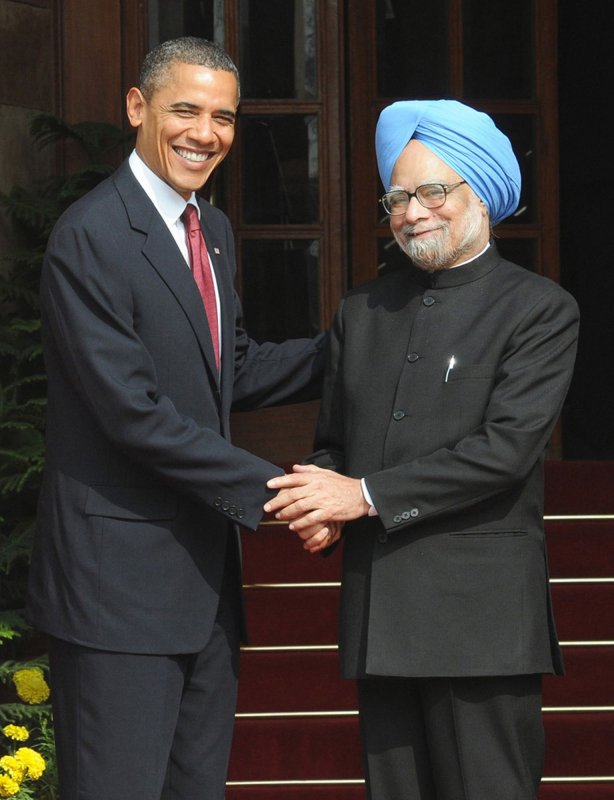United States President Barack Obama is greeted by Indian Prime Minister Manmohan Singh (R) at Hyderabad House in Delhi on Monday, November 8, 2010. UPI/ Raj Patidar |
License Photo
FRANKFURT, Germany, Nov. 15 (UPI) -- By agreeing to kick the can down the road for a few more months, the leaders of the world's main economies took a weird kind of decision while trying to duck one.
They decided to wait and see how this two-track world develops, of the emergent markets booming at an average 6 percent annual growth while the developed economies struggle to achieve any better than 2 percent.
It could be that the vibrant health of the emerging economies hauls the rest of the world back into health, so long as it continues. That is their hope. But the latest assessment of leading indicators from the Organization of Economic Cooperation and Development suggests that all the world's major economies will be slowing at once over the next six months.
China's growth is being deliberately slowed by the Beijing government, which fears a housing bubble and inflation. The German and Brazilian economies are already slowing as China reins in demand. India and Brazil are already worried by rising inflation. The huge inputs of stimulus spending in Japan, Europe and the United States are all running out.
Sources of future growth are therefore not easy to see in the months ahead. And the catch is that if there were to be growth, it would have to come through the exports of dynamic countries like China, Germany and South Korea. But for every exporter, there must be an importer and the usual big importers like the United States and Britain and Spain are in no shape to boost their own demand.
The Group of 20 leaders know all this perfectly well. Their final joint communique was explicit: "Risks remain. Some of us are experiencing strong growth, while others face high levels of unemployment and sluggish recovery. Uneven growth and widening imbalances are fueling the temptation to diverge from global solutions into uncoordinated actions. However, uncoordinated policy actions will only lead to worse outcomes for all."
But the G20 came up with no serious mechanism to steer such coordination. As a result, they are trusting to luck. They are hoping that the global slowdown won't be too abrupt, that the Greeks and Irish and Portuguese will continue to take their austere medicine and not plunge the eurozone into a renewed currency crisis and that the U.S. Congress won't lurch into protectionism.
This is the strategy of Charles Dickens's Mr. Micawber, who always trusted that something would turn up. And in the past, something usually did. It was called leadership and it was provided by the United States.
In the 1990s, President Bill Clinton stopped the Mexican debt crisis from spinning out of control. In the 1980s, the Reagan administration negotiated an orderly devaluation of the dollar and a revaluation of the yen. In the 1970s, for better or worse, President Richard Nixon closed the gold window and dismantled the Bretton Woods system of fixed currency rates that has been devised in New Hampshire in the final winter of World War II.
But these days, the United States appears incapable of leading. Having been stripped of his "Yes, we can" aura by the defeats his party suffered in the midterm elections, President Barack Obama found in Seoul that his stock had also declined in the international arena. His proposals were ignored and his government's policies openly insulted by Germans and Chinese alike.
German Finance Minister Wolfgang Schauble dismissed U.S. economic policy as "clueless," warning that the new $600 billion in quantitative easing by the Fed wouldn't work since U.S. problems were much deeper.
"The American growth model is in a deep crisis," he told der Spiegel in an interview last week. "The United States lived on borrowed money for too long, inflating its financial sector unnecessarily and neglecting its small and mid-sized industrial companies."
Yu Jianhua, China's trade minister, was just as critical, saying that Washington "should not blame others for its domestic problems and should not force others to take medicine for its own disease."
The problem is that in its current state of recession and political deadlock, the United States seems too ready to believe in this kind of criticism.
America is undergoing one of its recurrent moods of declinism. It did so in the 1950s when it feared that the Sputnik demonstrated Soviet superiority and again after the withdrawal from Vietnam and inflation and Watergate in the 1970s.
Each time the United States bounced back. And since it has the healthiest birthrate and the most promising demographic profile of any of the world's top economies and it remains the world's largest food exporter and the home of almost all its top universities, the United States will bounce back again. And it will do so just as China and Germany start to founder under their own dire demographic prospects of too many elderly people and too few young ones coming into the workforce.
Mr. Micawber was right. Something will turn up and that something will be the U.S. economic fortunes, probably driven by the new technologies of social media and iPhones and iPads that are changing the way we communicate.
And in a strange way, the G20 leaders recognized that. By refusing to take a decision in Seoul, they implicitly accepted that the global economic system will have to wait until the United States recovers its self-confidence and is ready to lead again.















